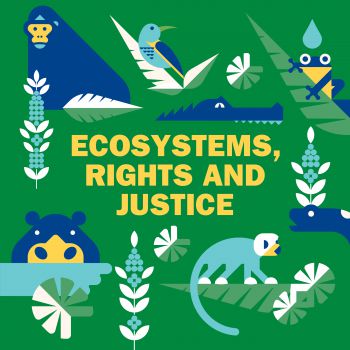Blog
Read the latest blog entries from our experts in the field.
SSRP in Review: Ecosystems, Rights and Justice
By: Edwin Gilson
Last updated: Friday, 23 May 2025

Overview
Our research in this theme has challenged and changed human-centric understandings of the natural world. Far from viewing nature as a mere resource ripe for human exploitation, our researchers have worked tirelessly to secure legal protections for natural sites worldwide and the populations who inhabit them.
The idea of nature having legal rights has progressed and is now entrenched in law in many parts of the world. Our research has contributed to advancing biodiversity and human rights research in the Global South, especially in South American countries.
Sustainable Development Goals
These projects primarily focus on the Sustainable Development Goals for: Responsible Consumption and Production (SDG 12), Climate Action (SDG 13), Life on Land (SDG 15), Peace, Justice and Strong Institutions (SDG 16), and especially their interactions.
International impact
Projects in our ‘Ecosystems, Rights and Justice’ theme have been based in the following countries: Ecuador, Brazil, Peru, Costa Rica, Cambodia, Zambia


In the media
- Research co-led by environmental justice specialist Dr Mary Menton, which showed murders of environmental activists had doubled around the world in 15 years, was covered by national media outlets including The Guardian and Newsweek.
- With the spread of Covid-19, Dr Menton was quoted in an extended BBC article about the Indigenous communities that have long warned of the links between environmental degradation and devastating disease. Drawing on her research, Dr Menton provided insightful context on the sustainable lifestyles of Indigenous peoples and how they contrast with the capitalistic practices that make pandemics more likely.
- BBC News spoke to researchers Professor Fiona Mathews and Dr Joanna Smallwood about their work protecting the Andean Bear and its habitat in Ecuador. The coverage was timed to coincide with the release of the third film in the much-loved Paddington franchise, ‘Paddington in Peru’, as Paddington himself is an Andean Bear.
Related resources
- Professor Mika Peck wrote a blog piece for us reflecting on the second Brazilian Forum for the Rights of Nature. Supported by an SSRP Impact Fund, this groundbreaking event brought together over 300 participants from Indigenous groups, NGOs, the UN, academia, and activists, united by a shared campaign towards the universal recognition of the Rights of Nature.
- Sussex graduate Sam Nurney wrote an informative and engaging article about working with the Ecoforensic CIC organisation in Ecuador – set up by Professor Mika Peck – which trains local communities to collect important ecological data to support ‘Rights of Nature’ cases.
- Ecoforensic CIC produced this beautiful video documenting their vital work in the cloud forests of the Intag Valley, Ecuador.
- We spoke to Professor Fiona Mathews about her SSRP-funded project on enhancing equitable and sustainable forest restoration in the Andean Bear Corridor for this blog.
- We also caught up with Dr Alex Shankland about his project strengthening territorial rights in Minas Gerais, Brazil, in the face of resource extraction.
- In this video, members of the Pueblo Ancestral Kichwa Kawsak Sacha, an Indigenous organisation in the province of Pastaza, Ecuador, describe how their soundscape is a critical point of contact for communication between humans and other beings in the forest. This is part of an SSRP-funded project led by Professor Alice Eldridge.
- Dr Jo Smallwood discussed the concept of ‘Rights of Nature’ in a Sussex Beacons Series talk, a recording of which you can watch here.
The full list of projects in the ‘Ecosystems, Rights and Justice’ theme can be found here.
To find out more about SSRP research across our five themes, come to the launch event of the SSRP review report, ‘Positive Futures for People and Planet’. The report is a comprehensive document of SSRP research over the last seven years.